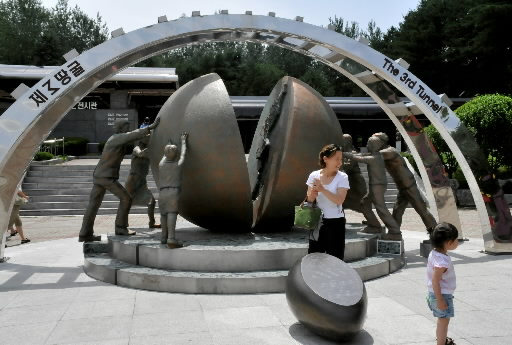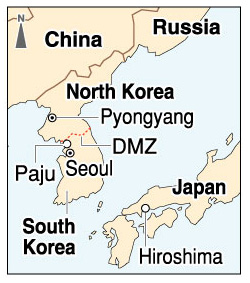Nuclear weapons can be eliminated: Chapter 6, Part 8
Jul. 31, 2009
Chapter 6: Instability in Northeast Asia
Part 8: The "non-nuclear" umbrella
by Junichiro Hayashi and Yumi Kanazaki, Staff Writers
Time for Japan to discuss "three-plus-three" security framework
In 2002 the city of Paju, South Korea, about 60 kilometers north of Seoul, installed a sculpture titled “Unifying Earth” consisting of a 1.5-meter diameter sphere that is split in two and supported by people on both sides. Against the background of rising expectations for reconciliation with North Korea, the sculpture was raised with hope for the reunification of the Korean peninsula and world peace.
In Seoul, Kwon Young-ghil, 67, a member of the National Assembly representing the opposition Democratic Labor Party, talked about his notion of a “multilateral group security system.”
“Conflict is the source of war, and the use of nuclear weapons will lead to the destruction of the human race. It will never guarantee a peaceful life,” said Mr. Kwon, who is also a member of the Parliamentarians for Nuclear Non-proliferation and Disarmament (PNND), a global network of parliamentarians.
Under Mr. Kwon’s system, countries would cooperate and create regional security systems that do not rely on nuclear weapons. This would entail creating a nuclear-weapon-free zone in Northeast Asia.
There is already a specific concept for such a system: a multilateral treaty under which Japan, South Korea, and North Korea agree not to possess nuclear weapons. In return, the U.S., China, and Russia would agree not to carry out nuclear attacks on them. Because it involves the nations of the six-party talks, it is sometimes referred to as the “three plus three” concept.
The ground has been laid for such a system. Japan’s three non-nuclear principles are national policy, and in 1991 South Korea and North Korea signed a Joint Declaration on the Denuclearization of the Korean Peninsula. China has declared a policy of no first use, and the U.S., which has advocated a “world without nuclear weapons,” and Russia have begun negotiating reductions in their nuclear arsenals.
“If a treaty can be worked out, the security of Japan, South Korea, and North Korea will be legally assured,” said Hiromichi Umebayashi, 71, special adviser to Peace Depot, a non-governmental organization based in Yokohama that has supported the three-plus-three concept since 1996. “The threat of nuclear attack will end, and the possession of nuclear weapons will no longer have any meaning,” he said. “But first we must put this on the table for discussion.”
But, because North Korea has stated its intention to withdraw from the six-party talks, “We must approach those governments through various channels,” Mr. Umebayashi said. Peace Depot is planning a voluntary meeting of members of the legislatures of Japan and South Korea to be held within the year.
There has been movement in Japan’s political circles as well. In August 2008 the Democratic Party’s Parliamentarians for Disarmament Promotion announced the draft of a treaty proposing the creation of a nuclear-free zone in Northeast Asia. Katsuya Okada, 56, chair of the group, said its proposal means “getting halfway out from under the nuclear umbrella.” He described their line of reasoning under which Japan would not request a first strike by the U.S. but would rely on the U.S. if Japan were the victim of a nuclear attack.
In response to the speech by U.S. President Barack Obama in Prague in which he called for a world without nuclear weapons, some members of the Liberal Democratic Party are also calling for a movement to urge the U.S. to ratify the Comprehensive Test Ban Treaty (CTBT). A trend toward denuclearization has begun.
There are now four treaties creating nuclear-weapon-free zones, including those in the South Pacific and Central Asia. They encompass 65 countries. Japan, the only country on which nuclear weapons have been used, is not included in any of them.
Can Northeast Asia be protected solely by the “shield” of U.S. nuclear weapons? As the only nation to have suffered an atomic bombing, it is time for Japan to consider a security system that is not reliant on nuclear weapons.
(Originally published on July 18, 2009)
To comment on this article, please click the link below. Comments will be moderated and posted in a timely fashion. Comments may also appear in the Chugoku Shimbun newspaper.









